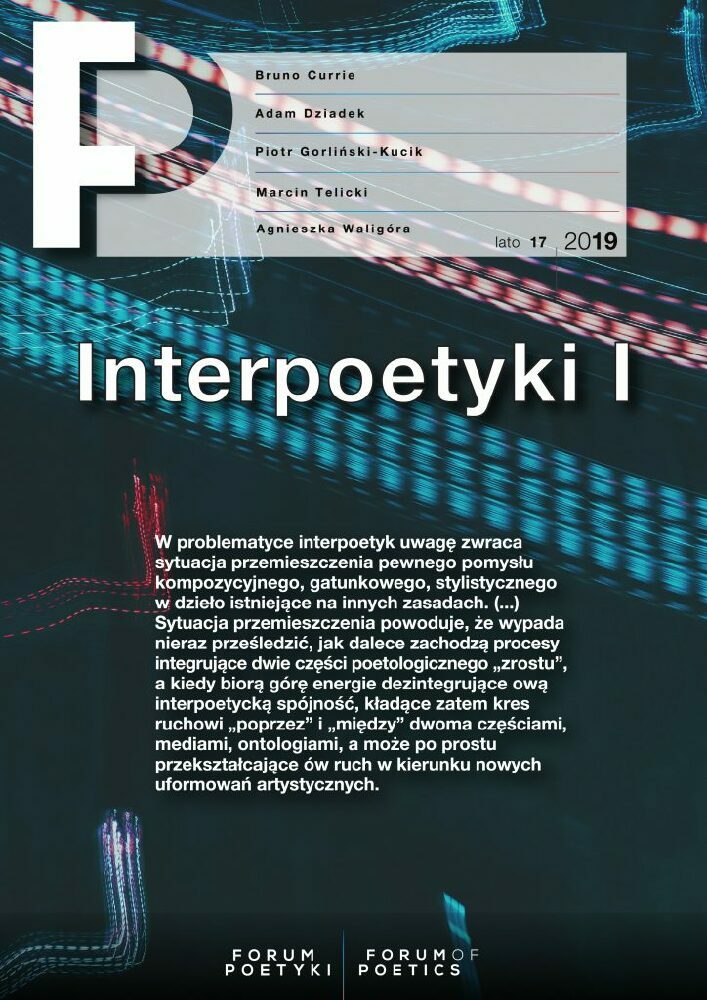Abstrakt
Artykuł jest fragmentem książki Bruno Curriego Homer’s Allusive Art, Oxford University Press, Oxford 2016, s 1-9, 12-18.
W swojej książce Homer’s Allusive Art. Bruno Currie broni tezy, w ramach której uznaje, że w najstarszych zachowanych przykładach greckiej poezji heksametrycznej można wykryć na-wiązania do wcześniejszej greckiej poezji epickiej. Punktem wyjścia dla argumentacji zapre-zentowanej w jego książce jest krytyczne omówienie i połączenie dwóch wpływowych, lecz odmiennych podejść badawczych wprowadzonych do studiów nad Homerem przez Foleya (tradycyjna referencjalność) oraz Pasquali’ego (sztuka aluzji). Swojego własnego stanowiska wobec obecności refleksów wcześniejszej poezji w między innymi Iliadzie broni autor poprzez stworzenie rygorystycznych ram teoretycznych, zastosowanie bogatej ilustracji w postaci przykładów (czerpanych nie tylko z greckiej tradycji epickiej) oraz poprzez skuteczną polemi-kę z poglądami innych badaczy
Bibliografia
Acosta-Hughes, Benjamin. Arion’s Lyre: Archaic Lyric into Hellenistic Poetry. Princeton, N.J.: Princeton University Press, 2010.
Allen, T. W. „The Epic Cycle”. The Classical Quarterly 2, nr 2 (1908): 81–88.
Andersen, Øivind. „Homeridae”. W The Homer Encyclopedia, zredagowane przez Margalit Finkelberg. Oxford, UK: Blackwell Publishing Ltd, 2011.
Andersen, Oivind, i Dag T. T. Haug, red. Relative Chronology in Early Greek Epic Poetry. Cambridge: Cambridge University Press, 2011.
Archi, Alfonso. „Transmission of Recitative Literature by the Hittites”. Altorientalische Forschungen 34, nr 2 (styczeń 2007).
Athanassaki, Lucia. „Performance and re-performance”. W Reading the Victory Ode, zredagowane przez Peter Agocs, Chris Carey, i Richard Rawles, 134–57. Cambridge: Cambridge University Press, 2012.
Austin, Norman. „Name Magic in the «Odyssey»”. California Studies in Classical Antiquity 5 (1972): 1–19.
Bachvarova, Mary R. From Hittite to Homer: The Anatolian Background of Ancient Greek Epic. Cambridge: Cambridge University Press, 2016.
„Hittite and Greek perspectives on travelling poets, texts and festivals”. W Wandering Poets in Ancient Greek Culture, zredagowane przez Richard Hunter i Ian Rutherford, 23–45. Cambridge: Cambridge University Press, 2009.
Bakker, Egbert J. Linguistics and Formulas in Homer: Scalarity and Description of the Particle Per. Amsterdam: John Benjamins Publishing Company, 1988.
Balot, Ryan Krieger. „Pindar, Virgil, and the Proem to «Georgic» 3”. Phoenix 52, nr 1/2 (1998): 83.
Barchiesi, Alessandro. „Voci e Istanze Narrative Nelle Metamorfosi Di Ovidio”. Materiali e Discussioni per l’analisi Dei Testi Classici, nr 23 (1989): 55.
Barnes, Timothy G. „Homeric Ἀνδροτῆτα Καὶ Ἥβην”. The Journal of Hellenic Studies 131 (2011): 1–13.
Baumbach, Manuel. „Borderline Experiences with Genre: The Homeric Hymn to Aphrodite between Epic, Hymn and Epyllic Poetry”. W Brill’s Companion to Greek and Latin „Epyllion” and Its Reception, zredagowane przez Manuel Baumbach i Silvio Bär. Paderborn: BRILL, 2012.
Baumbach, Manuel, i Silvio Bär, red. Quintus Smyrnaeus: Transforming Homer in Second Sophistic Epic: Berlin, Boston: DE GRUYTER, 2007.
Baumgartner, Albert I. The Phoenician History of Philo of Byblos. BRILL, 1981.
Birnbaum, Henrik, i Speros Vryonis. Aspects of the Balkans: Continuity and Change : Contributions to the International Balkan Conference Held at UCLA, October 23-28, 1969. Paris: Mouton, 1972.
Burgess, Jonathan. „Kyprias, the Kypria, and Multiformity”. Phoenix. 56, nr 3 (2002): 234.
Burgess, Jonathan S. The Death and Afterlife of Achilles. Baltimore: The Johns Hopkins University Press, 2009.
The Tradition of the Trojan War in Homer and the Epic Cycle, 2004.
Danek, Geord. „Antenor Und Die Bittgesandtschaft. Ilias, Bakchylides 15 Und Der Astarita-Krater”. Wiener Studien. 118 (2005): 5.
Danek, Georg. Studien zur Dolonie. Wien: Verlag der Östereichischen Akademie der Wissenschaften, 1988.
Ehler, Christine, i Ursula Schaefer, red. Verschriftung und Verschriftlichung: Aspekte des Medienwechsels in verschiedenen Kulturen und Epochen. Tübingen: Narr, 1998.
Finkelberg, Margalit, i Guy G Stroumsa. Homer, the Bible, and beyond: Literary and Religious Canons in the Ancient World. Leiden; Boston: Brill, 2003.
Fowler, Robert. The Cambridge Companion to Homer. Cambridge: Cambridge University Press, 2014.
Homerus, i R.B Rutherford. Odyssey: Books XIX and XX. Cambridge: Cambridge University Press, 1992.
Kirk, Geoffrey Stephen, J. E Raven, i Malcolm Schofield, red. Filozofia przedsokratejska: studium krytyczne z wybranymi tekstami. Przetłumaczone przez Jacek Lang. Warszawa; Poznań: Wydaw. Naukowe PWN ; Axis, 1999.
Lord, Albert Bates. Epic Singers and Oral Tradition. Ithaca: Cornell University, 1991.
The Singer of Tales. New York: Atheneum, 1978.
Lord, Albert Bates, i John Miles Foley. Oral Traditional Literature: A Festschrift for Albert Bates Lord. Columbus, Ohio: Slavica Publishers, 1981.
Montanari, Franco, Antonios Rengakos, i Christos Tsagalis, red. Brill’s Companion to Hesiod. Boston: Brill, 2009.
Homeric contexts: neoanalysis and the interpretation of oral poetry. Berlin; Boston: De Gruyter, 2011.
Nagy, Gregory. Greek Mythology and Poetics. Ithaca: Cornell University Press, 1990.
Homeric Questions. Austin: University of Texas Press, 2005.
Pasquali, Giorgio. Stravaganze quarte e supreme. Venezia: Neri Pozza, 1951.
Schein, Seth L. The Mortal Hero: An Introduction to Homer’s Iliad. Berkeley [etc.: University of California Press, 2013.
West, Martin Litchfield. Studies in the Text and Transmission of the Iliad. München; Leipzig: K.G. Saur, 2003.
Licencja
Za prawa cytowania fragmentów innych publikacji (tekstów, tabel, rycin oraz ilustracji) odpowiedzialni są autorzy artykułu.

